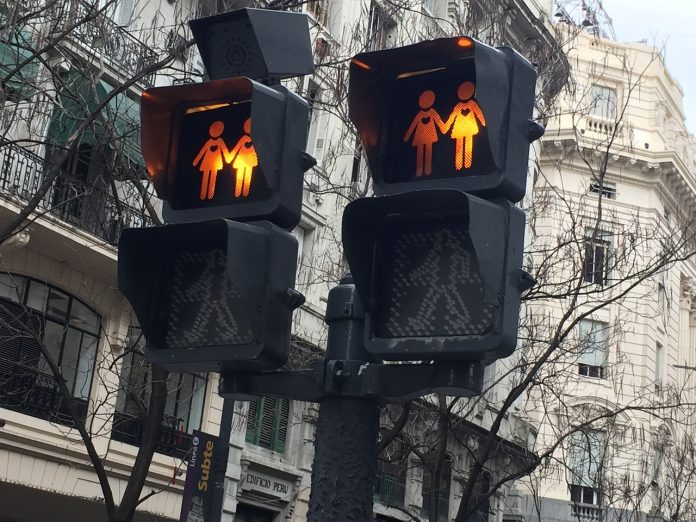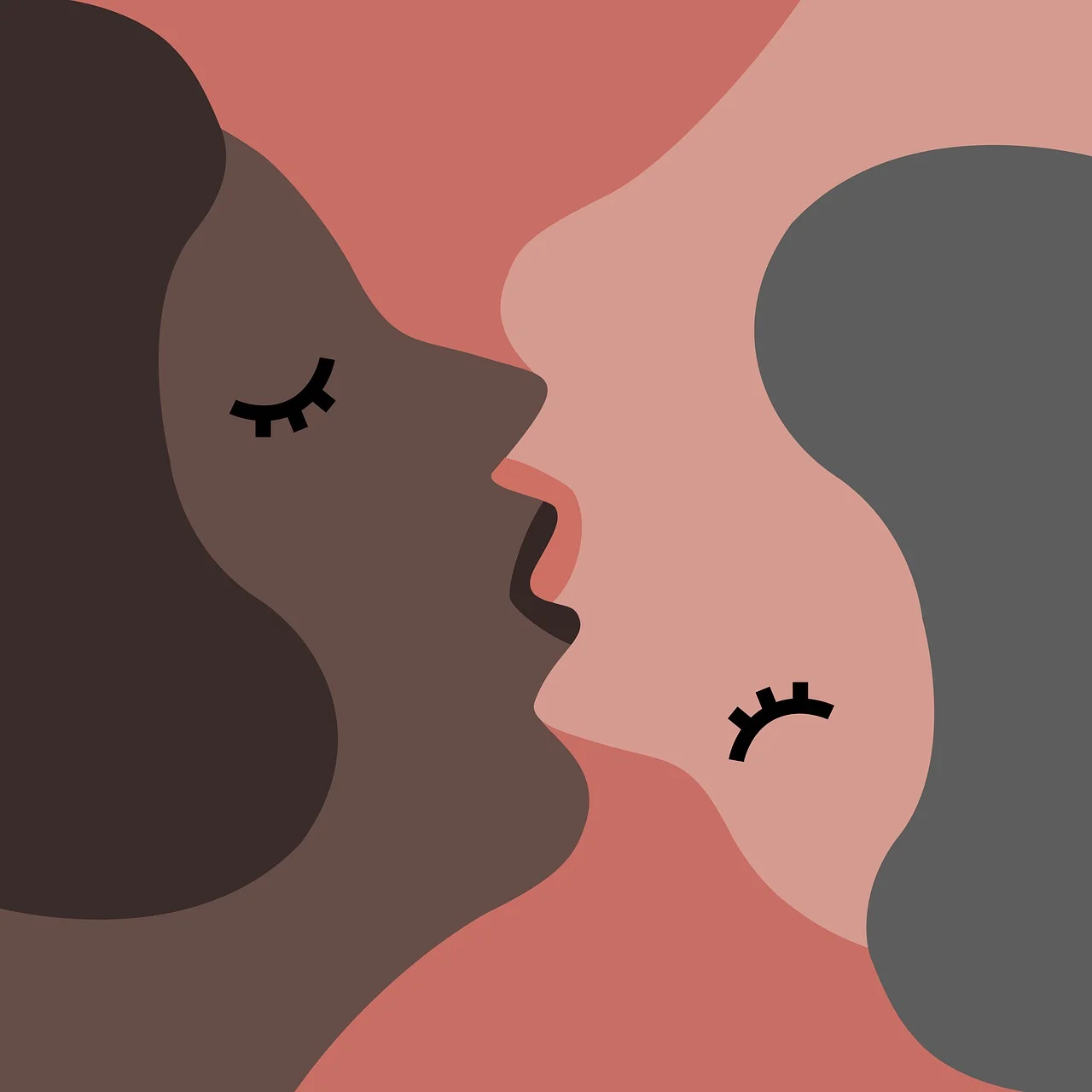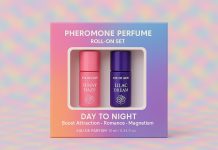In 1992, “very visible rebel dyke” Ky Hoyle founded of the United Kingdom’s first-ever sex shop for women, Sh! Women’s Store.
Since then, Hoyle has been an influential figure in the the sex toy industry, advocating for women’s pleasure by promoting the now-infamous rabbit vibrator, bringing sex toys to British hospitals and even bestowing a pleasure device on the wife of then–Prime Minister Tony Blair at an AIDS awareness event in 2002.
Historically, Sh! only invited men inside the shop if they were accompanied by a woman, an effort to hold a safe space which was later adapted to accommodate today’s increasingly gender-fluid clientele. Sadly, the brick and mortar in Hoxton closed during the COVID-19 pandemic, but the retailer still sells its products online where its blog and other sex education resources are also available at sh-womenstore.com.
Hoyle herself is a lesbian woman (apparently, she and her wife eloped in Las Vegas and are very happy together). In the beginning of her career, she weathered significant pushback from the modest British press, who portrayed her as a “pervy weirdo lesbian”―a descriptor she has proudly since reclaimed. Despite Sh! being only online today, the store refuses to fade into history and remains an important aspect of London’s LGBTQ+ scene, with Hoyle running workshops and pop-ups at community events.
Taken below from their website, TheBody recently spoke with Hoyle over Zoom to discuss people’s right to pleasure, fighting stigma and continuing to champion sexual liberation for all.
Rosen Pitman-Wallace: What’s the story behind Sh! Women’s Store?
Ky Hoyle: Everything about Sh! was a reaction to the context it was born out of, 30 years ago. It was a very particular time in terms of LGBTQ+ rights. The AIDS epidemic was happening, and there was so much hate being directed at our community. People wouldn’t touch [people living with HIV], and they’d say things like, “You can’t go to the London theaters. They’re all run by the gay mafia.” There was so much ignorance and homophobia.
And I suppose the AIDS crisis was a particularly important piece of context because we were learning as a community about the importance of safer sex and that we had to communicate about that. It was a sexual revolution in a way, even while it was tinged by the hatred that surrounded us at that time. So within that environment, I went shopping for a sex toy, and I just found it to be the most alienating, intimidating thing.
I got comments like, “Oh, we don’t see many women in here!” Or they’d think I was on the pull, looking for a man! It was just so uncomfortable. I even went to some gay sex shops, which were lovely of course, but they didn’t stock anything for my bits. I got more and more incensed and just stomped home. I’ve always been known for getting on my soapbox, and I was just fuming that there was nowhere for women in this atmosphere. So I think my friends just got so pissed off with me ranting about it that they said, “Well, why don’t you start one, Ky?” And I thought, “Well, I will!” And then I did.
Pitman-Wallace: How did you come up with the name?
Hoyle: When it came to naming, it was literally all a response to that day―no business acumen at all. A friend of mine who was Scottish, whenever she got a bit shy, she would say [in Scottish accent], “Oh shh, shhhh.” And we all thought it was so cute, and sort of a tongue-in-cheek play on how female sexuality is hushed up and silenced.
Pitman-Wallace: You’ve mentioned elsewhere that Sh! was connected to the lesbian SM scene at that time. Can you tell me more about that?
Hoyle: Well, have you seen Rebel Dykes? [A 2021 documentary about the London lesbian artistic and political scene in the 1980s.]
Pitman-Wallace: I have!
Hoyle: Well, Aphra, our operations manager, who’s actually still with us, talks in the film about how there were no dildos in this country and you had to smuggle them in from San Francisco. And still, they were very realistic penis-shaped, and while they could kind of get over that, they didn’t like the realistic testicles. So they would cut them off. But then [the dildos] would fall straight through the strap-ons! So that was another part of the context: this lesbian SM scene which was so sex positive and playful but was also criticized by an opposing, anti-sex feminist movement, who said it was violence towards women and we shouldn’t be doing it, and penetration was evil and all that―which is really just another form of dictating or restricting our sexuality.
As women, and as people with vulvas, we’ve always had our pleasure dictated to rather than having space to explore it for ourselves without any judgment or prescription on what we’re meant to enjoy. We were rebelling against that. Probably it’s that rebel thing which gave me the impetus to say, “Fuck everybody. We’re going to start our own!” I started it with 700 pounds, and it was supported mostly by my friends in the community for the first six months. Had they not come down every week and found something to buy, we wouldn’t be here 30 years later.
“I was just fuming that there was nowhere for women in this atmosphere. So I think my friends just got so pissed off with me ranting about it that they said, ‘Well, why don’t you start one, Ky?”’And I thought, ‘Well, I will!’ And then I did.”
– Ky Hoyle
Pitman-Wallace: What kind of pushback did you receive when you first started?
Hoyle: Well, nobody actually boycotted or physically held signs outside the shop or anything. But we were in Hackney, one of the most liberal boroughs in the city, and they took us to court for running an unlicensed sex shop.
Pitman-Wallace: Can you tell me more about that court case?
Hoyle: Well, for some context, a sex shop is defined as one that has a significant proportion of sexual articles. And in British law, a sexual article is defined as anything that encourages or stimulates sexual activity or the force and restraint associated with it. When they took me to court, I was just so fuming. Like, here we are, we’ve started something quite revolutionary in this borough that claims to be really invested in women’s rights, and yet they’re taking us to court!
So we saw them in court. I went to a gay solicitors’ and they got me a barrister named Terry Munyard. As we went into court, he said to me, “If we don’t win today, I won’t charge you. I’ll do it pro bono because I really believe in what you’re doing.” He was great, and we had this ridiculous day in court where Terry went through our entire stock asking, “Is this a sexual article?” And we had feather dusters and things, and he’s wafting them around. It was really quite comical. In the end, [the case] got thrown out of court because we worked to undermine that definition and show just how unreasonable it was.
“[T]his lesbian SM scene which was so sex positive and playful but was also criticized by an opposing, anti-sex feminist movement, who said it was violence towards women and we shouldn’t be doing it, and penetration was evil and all that―which is really just another form of dictating or restricting our sexuality.”
– Ky Hoyle
Pitman-Wallace: How has the sex toy industry changed since you started?
Hoyle: It’s massively changed! When I first started, I couldn’t find any clitoral toys. It was all for penetration, which doesn’t fit with how most women actually orgasm, which is clitorally. And our policy has always been not to sell anything that looks “realistic” or tries to imitate genitals in any way―basically because we’re saying toys aren’t replicas or replacements for anything. They’re toys! So, to begin with, there were very, very few toys we actually wanted to stock. But since then, there has been more shift towards toys for women’s pleasure and people with vulvas, and particularly the focus on the clitoris has gone way up.
But the industry still peddles a lot of … well, it’s an industry. It’s all about the cash. So a lot of places are seemingly very feminist and progressive. But they’re still not doing enough to smash ignorance around women’s bodies and women’s pleasure. And there’s still a big focus on penetration―the idea that that is “sex” and everything else is “foreplay.” If I had one wish, I would get rid of the concept of foreplay, because I think that would really open up a lot of people’s ideas about sex and pleasure.
Pitman-Wallace: What are you most proud of?
Hoyle: The big things I’m really proud about are VaginismusAwareness.com [which raises awareness about vaginismus and painful sex] and our work with cancer patients and survivors of sexual violence. For example, I got a letter from a customer sharing her experience at the store. She said she’d been raped as a teenager, and she’d had a lot of support and therapy but it didn’t actually help her in reclaiming her body and her pleasure, whereas her experience at Sh! had.
It really makes sense to me because as women, we’re taught a lot of the time that our pleasure is sort of ethereal―it’s all in the mind, it’s not in the body. So there’s not a lot of help for women who experience sexual violence, or indeed serious illness, with actually reclaiming their body or their physical sexuality. I’m really proud that we’ve been able to support so many people in doing that.
As we went into court, [my barrister, Terry Munyard] said to me, ‘If we don’t win today, I won’t charge you. I’ll do it pro bono because I really believe in what you’re doing.’”
– Ky Hoyle
Pitman-Wallace: Do you think there’s still a stigma around using sex toys?
Hoyle: Definitely, there’s still a lot of stigma around toys. One of the things that drives me nuts around toys—and even around lube—is when people say, “Oh, I don’t need that.” It feels so laden with judgment. We don’t have to talk about need; it doesn’t have to be necessity―it can be about enhancement. We all have those negative messages put on us, whether they’re directly dumped on us by someone or they just come in through osmosis from the culture. None of us are free yet!
“If I had one wish, I would get rid of the concept of foreplay, because I think that would really open up a lot of people’s ideas about sex and pleasure.”
– Ky Hoyle
Pitman-Wallace: And what about around women’s sexuality, particularly queer women’s sexuality?
Hoyle: Absolutely! Even if we’re usually not subject to really direct messages of, “Your sexuality is evil,” there is still a lot of negativity and subtle judgment that we’re not really aware of unless we have our antennae up. Just Like Us, a U.K.-based LGBTQ youth charity, recently found that lesbians, out of the whole LGBTQ community, are the most ashamed of their sexuality! We need to do a lot of work to fight that, but unfortunately I feel like in the conversations around lesbian visibility, a lot of us are trying to paint over the actual sexual part of our identity, to make it invisible. And as someone who founded a sex shop in the 1990s, as a very visible rebel dyke, I think that’s a real shame.
After all, for many of us, that’s what defines our lesbian identity: having lesbian sex. I think it’s done to over-correct for the ways lesbians have been objectified and hyper-sexualized in the wider culture, which I understand. But I don’t think that’s the right way forward. I think we need to work hard to reclaim our sexuality, in order for young lesbians not to feel ashamed.
Read the original story on TheBody right here.















You must be logged in to post a comment.